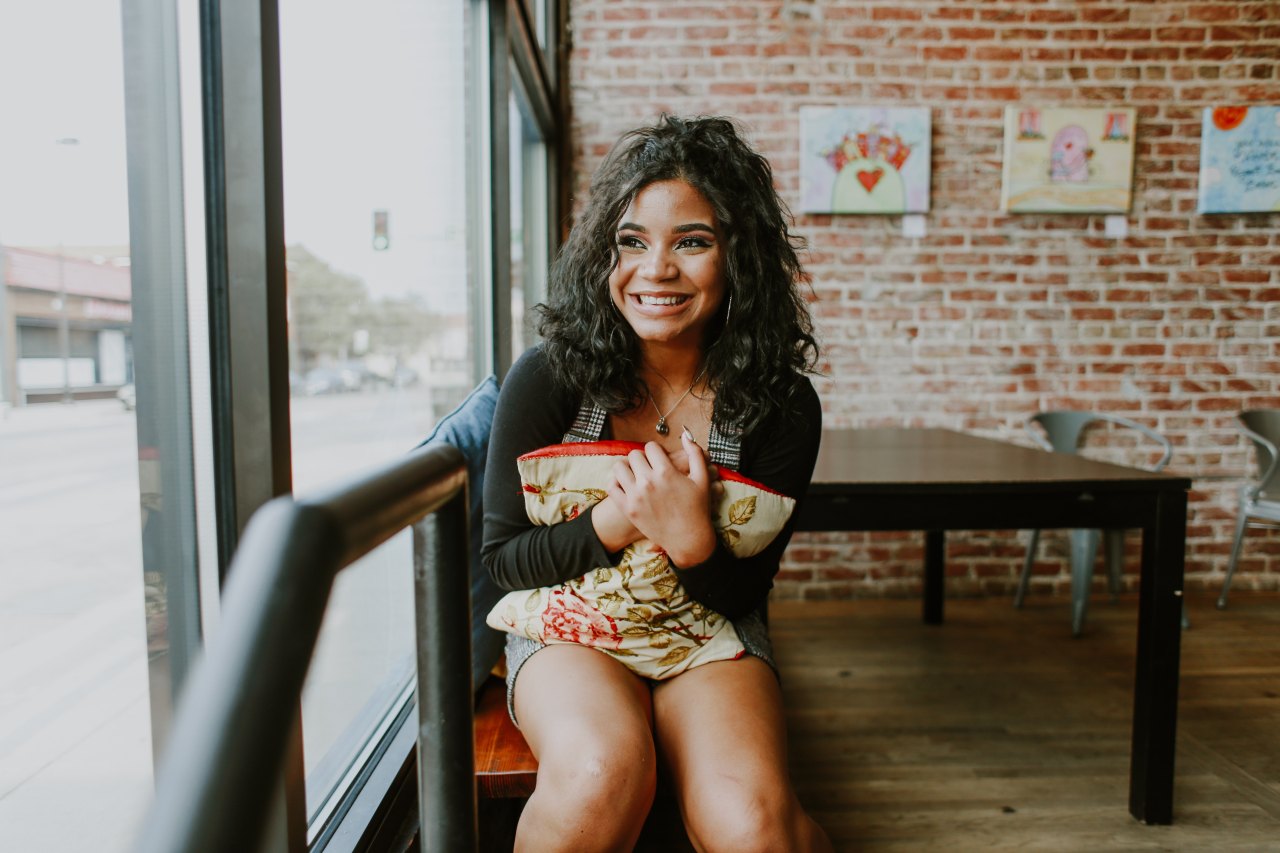
50 Ways To Befriend Someone Who Suffers From Social Anxiety
Ask Reddit knows how you should treat your friends with anxiety.
1. In some way, let them know that you like them and want to be their friend. This is a huge issue for people with social anxiety. They fear that people won’t like them or don’t want to spend time with them so taking the first step and eliminating that insecurity can give them the confidence they need to open up.
2. As someone with social anxiety:
-
Find a common interest you can talk about. If you can’t, the friendship will probably never happen. We can’t just do small talk for hours.
-
Be patient, if they are not opening up immediately, it’s not because they don’t like you.
-
Take the lead in trying to set up get-togethers, at least for a while. It’s hard to reach out to someone to arrange something when you have social anxiety.
-
Do arrange one on one meetings over group meetings. We suck at group conversations. With everyone talking over each other we can’t get a word in and feel ignored. Some socially anxious people avoid these things altogether.
-
Lead the conversation, give us something to talk about, open new topics and shit. If you find the right topic (see point 1) you can get great conversations.
-
However, “lead the conversation” doesn’t mean talk over the person and never let him get a word in. Don’t be overbearing.
-
Don’t do stuff like joking “roasts”, some people like it but someone with social anxiety will likely assume you legitimately hate them.
3. Talk to them a lot.
Talk, retreat. Talk, retreat. Repeat.
We love talking! We hate being trapped talking.
4. Talk about yourself and your interests. It’s a lot easier for me to jump into the conversation that way. My mind always goes blank when people I don’t know well outright ask me questions about myself. I am my least favorite subject to discuss with people I’m not close to.
5. If you have some shared interests, talk to them about them. Encourage them to talk but don’t pressure them. #1 thing to avoid is putting them on blast. Questions like “why are you so quiet?” are a big no. If you’re in a group setting, don’t ask them a question and then direct everyone’s attention to them when they’re about to respond. Give them time to warm up to you :-) You may not be great friends straight off the bat but you have the rest of your lives. Take it a day at a time.
6. Keep the conversation going
Don’t point out times when they stutter or stumble. It’s minor for you but they think about it all day.
Don’t draw attention to any odd body language. They know they walk all stiff because their nervous and their muscles have tensed up. Yes, they know that they can’t make any facial expressions more emotive than a ham sandwich. Yes, they know they look weird. (This might’ve been an allergy to the medication I was on at the time or the Anxiety Disorder – I have no idea)
Don’t force them into conversations with people they don’t know.
Invite them to events, even if they keep cancelling on you. People with Social Anxiety Disorder like to know that you thought of them and wanted them there, but they might be too anxious to turn up.
Order for them at restaurants. This one’s important. I’ve recovered now, but my diagnosed SAD would mean I couldn’t order a milkshake at McDonald’s without my throat seizing up.
If they don’t initiate conversation with you or say “hi” in passing, it’s because they’re likely too anxious to for fear of rejection, not because they’re trying to be rude. Keep talking to them please.
7. Find something you have in common with them, look for an opening, and capitalize on the opportunity to speak to him or her.
8. Be confident, but make them feel comfortable by giving them personal space, talking in a quiet voice, keeping gestures subtle. Don’t attempt a handshake after the first few meetings.
Avoid too ambiguous questions such as “How are you?” Instead, ask more concrete things such as what are their hobbies, future plans, etc.
Be patient and don’t rush. They haven’t ignored the question, they just need more time. Don’t try to force the conversation along. Silence is completely normal and it gives you time to consolidate your thoughts. Silence only becomes awkward if you make it awkward. Your presence, acceptance and understanding are a thousand times more important than words.
Never nudge, attempt to “help” them or make them do something they’re uncomfortable with.
Compliment them.
Even though they might find it difficult to express their emotions and they might not seem very enthusiastic about the interaction, they will be extremely grateful that you gave them your attention.
I hope this helps.
9. Skip the small talk, as sometimes it can be harder for someone with social anxiety to know what to say. Instead, try talking about something specific; “What’s your favorite Disney movie?” “I heard you like Taylor Swift, I really like that one song she has”, that way the person you’re talking to doesn’t feel overwhelmed over trying to continue small talk (speaking as someone with social anxiety, small talk can sometimes be very overwhelming when you don’t know what to say). Also the big thing is be patient, and assure them that they can take their time and don’t have to rush to feel comfortable with you. You can also ask the person if there is anything that you should avoid that may be a trigger for their anxiety, or if there is anything you can do to help them (like if theirs afraid to order at McDonalds, offer to place the order for them), as taking their illness into consideration can help build trust which can be hard to do depending on the severity of the person’s social anxiety.
10. Persistence without being aggressive
Approach them with the offer of being social…but if they recoil, then back off. It’s a matter of just becoming comfortable with you for them.
11. Be straightforward. A person with social anxiety is always considering all bad scenarios, reassure them that you will tell them exactly how you feel, so they don’t have to worry about everything they might be doing wrong and that you’re secretly judging them for.
12. As someone with social anxiety, I think you should try to be very proactive in the friendship and show them you value them as a friend. Dont be too pushy and try to relate to them. But honest just treat them like anyone else.
13. Carry the conversation, we love listening
14. You just kind of talk at them until they know you are a friend. I don’t baby them but in a big group I just keep an eye out – you can see they want to join but don’t know how. I make eye contact and might move over so there is space next to me or grab an extra chair and lowkey wave them over.
If people say things like “oh you DO talk” to them, jump in with a “they talk all the time” comment and confused look. The fastest way to get a shy person to never talk again is to point out they are shy.
15. Don’t be offended if they cancel plans at the last minute.
16. Be patient. I will decide to reciprocate your overtures in my own time and at my own pace. Rushing me just means I walk away because you aren’t worth the stress.
17. Speak with them online for a while until they get comfortable, and then when they are comfortable, Ask to Video Chat, then eventually meet them IRL
18. PSA: If you do have a friend/SO/loved one with social anxiety, don’t give up on them. If you ask them to go do something ten times and they say no ten times, keep asking. Remind them that they always have fun when they get there, it’s just the lead up anxiety about going out in public. Gently help to desensitize them to social situations. Choose small venues at first: bbq with a few friends, game nights with a few friends. That way they’re socializing but it’s not so public. Then you can graduate to going to the movies or through the drive thru. I’m talking severe social anxiety here. Obviously everyone won’t need these baby steps but sometimes people do. It depends on how bad the trauma/PTSD is. You can befriend someone with social anxiety by showing them that you’re trustworthy and you won’t make jokes at their expense and things like that. Don’t add to their anxiety, be a soft place to land. Sensitive people are often the most beautiful. You just have to be invited into their bubble.
19. Please just give a shit. Nobody gives a shit.
20. I find distraction is great. Get them talking about something they enjoy or they’re looking forward to or something that is going well.
21. Clear Boundaries. My social anxiety mainly stems around how other people think of me. The more obvious you can communicate what is and is not okay to do around you, the easier it will be for me to interact with you.
22. Persistence! Reach out in little ways, consistently (works best with someone you see regularly, like at work or school). Use their name often.
Listen to them. When quiet people speak up, it usually is really meaningful to them. Let them be heard!
Figure our their interests, and make conversation about it. It will be easier for them to talk about things they know/are interested in.
Be patient. They may seem stand-offish or disinterested, but they’re probably just shy.
Include them! In conversations and plans with others, invite them along. It might help them open up.
23. Be the one to start the conversation. Please.
24. Wait until a few times of talking to them before getting too personal otherwise you’ll make them feel uncomfortable, and don’t draw a lot of unwanted attention to them or be offended if they don’t want to go out as often.
25. Talk to us. Start a conversation. We cannot start conversations. Make us feel welcome in gatherings.
26. Have patience. I’m usually pretty wary of people and tend to spiral and second guess myself.
27. Don’t make it a thing, treat them like youd treat anyone else. Don’t impose and just be cool. Talk to them about stuff that they like, make stupid jokes. Find commonalities.
28. A lot of people are saying to start the conversation. True, but we need that person to move it forward as well. Be the one to send friendly texts. Sit down next to that person at lunch. It’s really paralyzing when you want to move a friendship forward but aren’t sure of yourself.
29. As someone with social anxiety, I will give you a huge tip.
We, at least I, second guess everything anyone does to me that is nice. I see no reason why anyone would be nice to me, without having ulterior motives.
This is gonna sound wrong, but you have to give them space. While, at the same time, try and show them that you care.
I’ll be straight up with you, it’s gonna be really fucking hard. The 2 friends I have, I am so thankful for, because I’m a pain to be around. But, if you stick with it, you’ll have a companion for life who’ll fight to the death for you.
30. On a related note, if you have trouble getting me to open up in person, try and get me to open up over text/email/instant messaging. Why? Well, in person with anxiety there’s no time to think over our responses, and that inability to really filter what we say in advance can lead to a lot of anxiety. That’s why many anxious people just get really quiet and close up. When we’re not face to face, and I can spend a few minutes deciding what to write to you, a HUGE chunk of that anxiety is simply gone. The great thing here is that if you get me to open up and feel comfortable chatting to you over text, the next time we interact face to face, we’ll know each other better and have more to talk about. You’d be amazed at how someone can go from completely quiet around you to talking your ears off just because you spent some time chatting to them over text/email/IM and getting them to open up.
31. You have to let us be nervous. You don’t have to fix it, just let us express it. Be a calm presence. Don’t dismiss what we are saying (“Oh, you worry too much”), but don’t play into it too much either (“Yeah, that could happen. Who knows.”) Sometimes anxious people just need a stable person to hang onto while they balance themselves. If I feel supported by you, I will begin to calm down. You can’t get rid of anxiety in two seconds or by forcing it away, so patience is good. It feels great getting over that hurdle as an anxious person though, and we do want to get over it. We hate feeling this way as much as someone else might hate being around it.
32. Do things separately together. One of my most cherished memories is playing Skyrim on the couch on my Xbox while my best friend was playing Skyrim next to me on his xbox. We could both do our own thing in game but look over and comment on what each other was doing when we would see the other person doing something cool.
33. Have patience with them. I’ve rejected otherwise friendly gestures and actions because I was afraid of embarrassing myself, or I was worried that people were playing mind games with me in order to hurt me later.
34. If you keep talking to me I’ll eventually assume we are friends. If you slip in “I’m glad I became friends with you” in there somewhere eventually then ill know for sure and I won’t sit there wondering if its real.
35. Make me feel included. Ask me out for meals, activities etc. But don’t put me in the spotlight or expect me to actively participate in conversation (especially when it’s a big group) until I am comfortable enough.
36. Please be the one to start the conversation. We can’t do it. And if there’s a break in conversation for a while, please forgive it. Along with anything awkward that might be blurted out. Sometimes I can’t think of anything so I say the first thing to come to me.
37. Ask them out on adventures often, don’t get bummed if they decline 99% of the time. It helps me build up my confidence if my friends remember me and make sure I know they want to be around me.
38. Smile a lot. It puts people at ease.
39. Remind them constantly that they’re doing well. Never point out their blunders or mistakes whenever they do something that triggers their anxiety but instead tell them they did better than before even if they didn’t. They’ll be more confident and less nervous. Respect their boundaries. If they don’t want to do something, never let them do it. Let them talk about something that interests them and are passionate about, their anxiety will be less than talking about something else.
40. One of my friends has extreme social anxiety. Before she became my friend, I noticed that she would pace back and forth before doing something involving people only to change her mind and walk away. I started to speak up for her in social situations like “Excuse me, can I have an extra slice of cake please,” and then giving it to her because she was too nervous about asking for a slice or “Don’t treat her like that! She’s just a little nervous. Everyone gets nervous about things sometimes” if people laughed at her for being awkward. I also noticed that she liked musicals because she had pins on her backpack from them and tv shows that I like too. I know absolutely nothing about musicals, so I asked her to tell me about her favorite one. Her eyes lit up and she talked for about 45 minutes while barely taking a breath. Eventually, she grew more comfortable with talking to people as long as someone is with her for support and I’m super proud of her. She has worked so hard at being able to do that and it’s only going to improve even more. So, just try to do things for them and start talking to them about things you can tell they like.
41. Do things one on one. Start the conversations. Keep the conversation alive. If they start to act weird and look like they’re trying to get away let them and give them a break.
42. Give them space when necessary. Hanging out with people, even people I really like, is mentally exhausting to me. I go through phases with my anxiety where sometimes I just need to hang out by myself for a few days, maybe even a few weeks. My long-term friends have learned to accept my disappearances as just one of my quirks.
43. A trick that worked very well on me: ask them for help, even if you don’t really need it.
It took me ages to realize that my extrovert best friend was cleverly bypassing my social anxiety. Every time I psyched myself out, he’d call me with some manufactured excuse why he desperately needed me to show up, and I’d fly out the door with no fear whatsoever because hey, I was needed, and therefore obviously welcome and wanted, because I was providing tangible value.
44. Don’t corner us. It sounds weird but for me all conversations have to be natural. It’s hard to interact when I feel the conversation was just a way to prove I talk or prove a point. Also expect sometimes when a conversation dies down, we may end it abruptly and move on. I try to stop myself from doing this but it’s a 50/50 thing at the moment.
45. One thing that works is when someone makes me laugh, it’s like a good ice breaker. Oh and not looking like a creep.
46. First know that each person will be different, don’t expect a one size fits all for everyone, this’ll work for some but others it’ll push away.
The simplest answer is to start talking to them, you won’t become great friends just by doing this but you’ll get them to open up.
If you want to become good friends the following usually helps. Don’t treat them any differently than anyone else, don’t force a response, just talk to them. It doesn’t have to be anything too fancy just do it every day and they’ll slowly warm up to you. Don’t approach as a group. Start with one or two at the most and have everyone slowly get to know them. Once they’re somewhat comfortable with everyone in your group then you can start talking to them in larger groups. Most importantly don’t interrupt them with something irrelevant, nothing will make them shut down more than being interrupted because it feels like you don’t care about what they’re saying. Try to include them in things but don’t force it. Never assume they wouldn’t want to go do something if they always say no, they may really just be busy or not be comfortable enough yet to do something with a lot of people or they might be too poor to afford whatever it is. Don’t expect common social norms to apply with them and don’t get angry if they say or do something that seems rude. A lot of people with social anxiety have it because they know they’re poorly spoken in those regards so pointing those things out, especially in a passive agressive way, or getting angry will validate that anxiety and cause them to shut down again. Eventually they’ll be comfortable enough with you that you don’t have to do any of this if you’re willing to put in the work to get to that point. It sucks doing it but usually they end up being good, loyal friends.
47. I have social anxiety. I’d say just be patient, be aware that they are probably not being rude, they are just anxious a lot of the time. I’ve had a few friends say they assumed I was a bitch when they met me. Also if they say they can’t do something, listen to them. People don’t often believe me, but when I’m anxious I physically can’t force myself to talk, or talk loudly, or move.
48. As someone with social anxiety the only advice I can give is think of them as a skittish deer. Don’t be loud, don’t be in their face, IF THEY WANT TO LEAVE DO NOT CHASE THEM offer to walk with them, be gentle, be quiet, and offer food. That’s all I got.
49. Figure out how much personal time they require and respect it.
50. I think it’s important to understand that people have different kinds of anxiety. Some people struggle with initiating social interactions because they get caught up trying to anticipate how the events will play out- the things that could go wrong, and simply the different paths forward the situation might take. They want to predict everything, and control it, and be prepared for it, but once they are integrated into the flow of conversation you wouldn’t even know they have anxiety. Others still simply become more and more burdened the longer they are active in a given social situation. Despite possibly enjoying a big group discussion, they tire of the sensory overload, and need a break. Just a couple examples, but the point is that anxiety takes many forms with different people, and it’s important to understand what things are triggering their anxiety. Not every approach will work with every anxious person.
I think the broadest approach would be to try to initiate conversation in a 1on1 environment that they would feel comfortable in. ![]()











